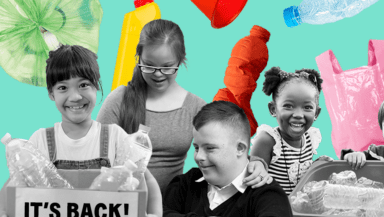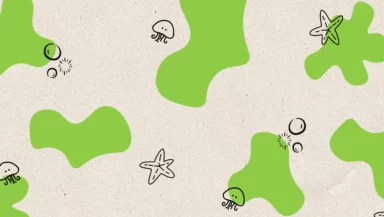Footage available here.
Greenpeace UK has today disrupted the start of Unilever’s Annual General Meeting in an escalation of its global campaign against overwhelming plastic pollution produced by their Dove brand.
The action comes as Greenpeace releases new polling showing support across global markets for Unilever to take action on their plastic pollution problem.
As the AGM at the Hilton London Bankside was getting underway, activists used a confetti cannon to send a shower of black paper Doves raining over the Unilever board. The confetti represented the 140,000 signatories to Greenpeace’s open letter calling on Dove and Unilever to ditch their single-use plastic. It was designed like a subverted version of Dove’s iconic logo, with the traditionally gold bird pictured deceased and in black.
At the same time, several activists stood up in the hall holding a banner saying “Dove Ditch Plastic” and chanting “Ditch plastic or we’ll ditch Dove”. The activists were then escorted out of the room by security.
Polling conducted by Censuswide for Greenpeace across 19 countries found that:
- 63% felt more negatively towards the company when they learnt they were the biggest plastic sachet producer globally [1]
- 65% said they were influenced towards avoiding Unilever products when they learnt the company had been ranked amongst the top 5 plastic polluters and that it was the biggest producer of plastic sachets globally.[2]
- 78% agreed they would support Unilever ending their use of single-use plastics [3]
- 80% agreed they would support Unilever offering reusable packaging [4]
Questions over Unilever’s green claims and its environmental impact are set to dominate this year’s AGM with other campaign groups and activists expected to pressure the company throughout the day. Members of Friends of the Earth Indonesia and members of Indonesia’s Sulawesi community are expecting to press Unilever board members on the ruinous impact of its palm oil use. Alongside this 100 youth activists from the Netherlands are also attending the AGM expecting to push the company to stick to the Paris climate agreement and reduce its greenhouse gas emissions by 48% by 2030.
Greenpeace are calling on Unilever to stop sachet sales now, and phase out single-use plastic within 10 years. They are also calling on the company to use its influence to advocate for these goals at the UN Global Plastics Treaty negotiations through its role as a co-chair of the Business Coalition.
Nina Schrank, Head of Plastics at Greenpeace UK said:
“From palm oil to plastic pollution, Unilever can’t hide from the Real Harm they’re causing. Whilst products like Dove help Unilever rake in billions, the real cost is paid by communities far from today’s AGM. But civil society and impacted communities are here today to tell them this has to end – it’s time to change.
“This is not the time to backpedal. Schumacher needs to be reducing plastic waste, not his waste targets. They must stop selling plastic sachets now, commit to phasing out single-use plastic within a decade and advocate for this same level of ambition at UN Global Plastics Treaty negotiations.”
ENDS
For access to polling tables and other requests contact – press.uk@greenpeace.org – 020 7865 8255
Notes to the editors:
[1] ‘Much more negatively’ and ‘Somewhat more negatively’ responses combined
[2] ‘Significantly influenced’ and ‘Somewhat influenced’ responses combined
[3] ‘Strongly agree’ and ‘Somewhat agree’’ responses combined
[4] ‘Strongly agree’ and ‘Somewhat agree’ responses combined
[5] The research was conducted by Censuswide, among a sample of 19,088 general consumers in the UK, USA, Canada, India, Brazil, Egypt, Germany, Mexico, South Africa, Philippines, Indonesia, Japan, Thailand, Korea, China, UAE, Malaysia, Austria, and Norway.
The data was collected between 16.02.2024 – 26.02.2024.
[6] Unilever recently announced it was scaling back its plastics targets. The company’s reduced plastics ambition can be read here
- New target – 30% virgin plastics reduction by 2026
Previous target – 50% virgin plastic reduction by 2025
- New target – 100% of plastic packaging to be reusable, recyclable or compostable by 2030 (for rigids) and 2035 (for flexibles)
Previous target – 100% reusable, recyclable or compostable plastic packaging by 2025



